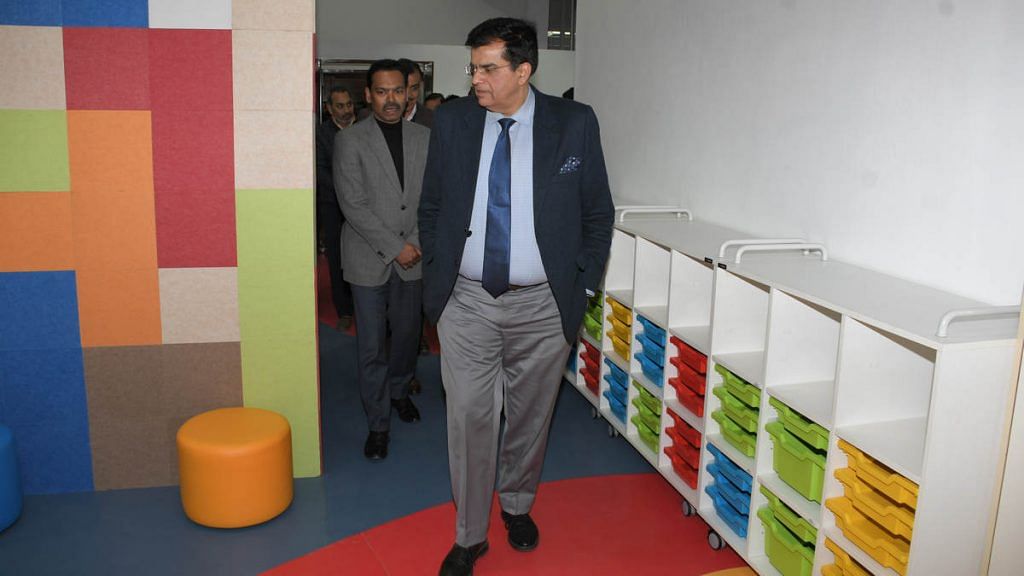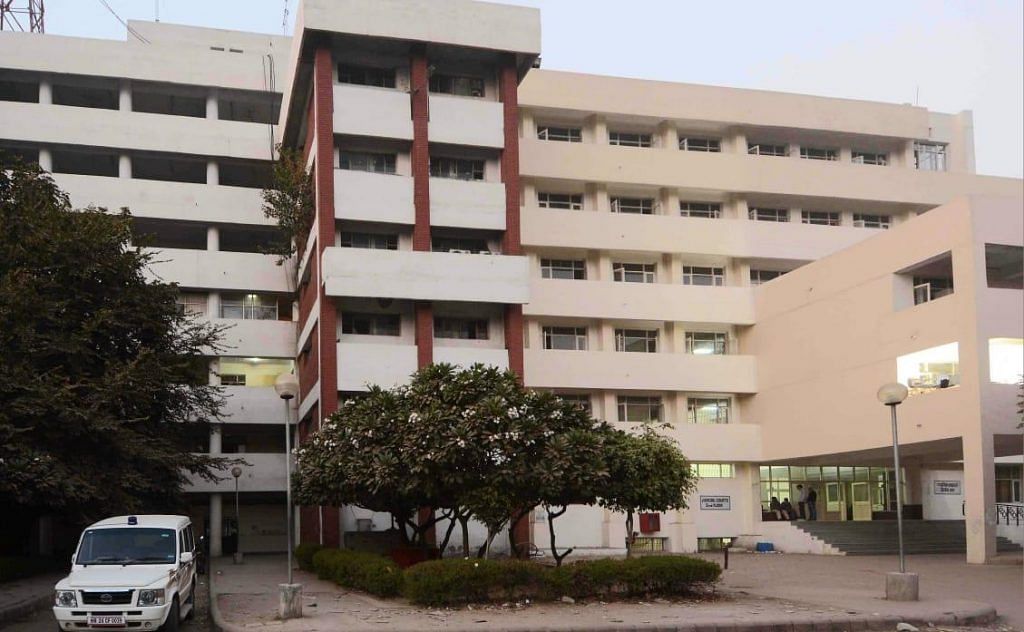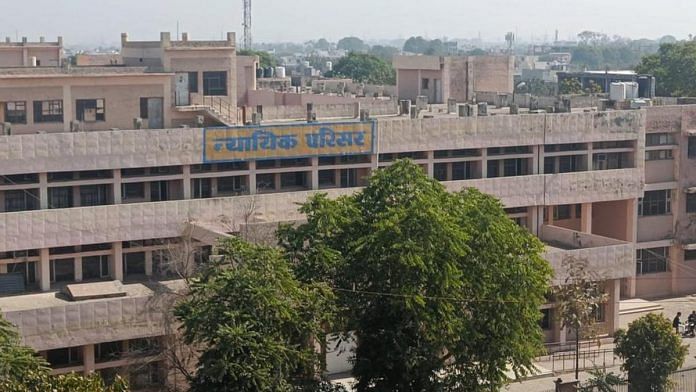Chandigarh: Haryana is bracing for the humongous task of giving all its civil and criminal courts a full Hindi makeover by 1 April this year. The endeavour will entail re-training hundreds of court staff, conducting language orientation programmes for lawyers, and preparing judges to start giving their verdicts in Hindi rather than English.
The reason for the switch is to make court proceedings more accessible to the Hindi-speaking public, but the existing judicial machinery in the state currently runs largely on English.
All the readers, stenographers, and data entry operators working in the courts were recruited for their command over English, but now they will have to do all their official work in Hindi. Similarly, lawyers will have to be trained to plead and argue in Hindi and judges too will need to transition to the vernacular in their observations and judgments.
With the deadline looming, Haryana chief secretary Sanjeev Kaushal chaired a meeting Monday with senior officials from across departments to prepare a plan to accomplish the mammoth task.
Speaking to ThePrint over the phone, Kaushal said: “We plan to have master trainers in all the districts so that they can impart training to the court staffers. Besides, various departments have been told to upload Hindi translations of Acts and Rules pertaining to them on the website so that the general public is able to understand their meaning.”
The move to Hindi was set in motion last December when Governor Bandaru Dattatreya approved the state government’s proposal to amend the Haryana Official Language Act, 1969.
The amended law makes Hindi the standard language for “courts and tribunals subordinate to the Punjab and Haryana High Court”. It also makes it incumbent upon the state government to “provide the requisite infrastructure and training to the staff within six months of the Haryana Official Language (Amendment) Act, 2020”.
A 13 December state government statement said that the law would apply from 1 April 2023, and that the decision was made so that litigants could get speedy justice in their own language and “not remain speechless during the proceedings”.
The statement also pointed out at a precedent in Punjab, implemented over 50 years ago. In 1969, the Punjab Official Language Act, 1967, was amended to stipulate the use of Punjabi in all the proceedings of civil and criminal subordinate courts in the state.
However, despite the ongoing efforts to prepare for the change in Haryana, implementation is more complex than it seems on the surface, said government officials and judges that ThePrint spoke to.
Also read: Hindi medium in colleges, govt, recruitment exams…and UN — what Shah-led language panel wants
Training courses, new terminology
There are currently 21 district courts in Haryana, according to the website of the Punjab and Haryana High Court. Several other courts come under the jurisdiction of each district court, including sessions courts that hear criminal matters, various civil courts, family courts, and some tribunals.
Each court comes with a small army of staff, not to speak of lawyers, judicial magistrates, and judges. Haryana’s district and other lower courts have as many as 283 judges, going by data on the high court website.
At the Monday meeting chaired by Chief Secretary Kaushal, numerous senior officials put their heads together to review the state’s preparedness for the implementation of the Hindi plan for all these courts and their employees.

Among those who attended the meeting were Haryana advocate general Baldev Raj Mahajan, principal secretary of (Information, Public Relations, Language and Culture) Anurag Agarwal, the Chief Minister’s additional principal secretary Dr Amit Agarwal, principal secretary (Higher Education) Vijayendra Kumar, commissioner and secretary (Youth Empowerment and Entrepreneurship) Vijay Singh Dahiya, and Haryana Higher Education Council chairman Prof. BK Kuthiala, and other senior officers and representatives of the Punjab and Haryana High Court.
Speaking to ThePrint after the meeting, Prof Kuthiala said that it has been decided that the Haryana State Higher Education Council will impart Hindi training to the staff of courts and offices.
“We will take the help of colleges and universities of the state for this purpose. First, the training will be started at Panipat as a pilot project. Those who will attend this training programme will be given certificates. Apart from this, the council will also consider short-term courses in translation from English to Hindi language,” he added.
Kaushal told ThePrint that in addition to training programmes for staffers and translations of laws and rules, department officials have been told to prepare Hindi alternatives to the English terminology used in civil and criminal courts.
Changes are afoot for the judge recruitment exams for subordinate courts held by the Haryana Public Service Commission (HPSC) too.
“The HPSC has been urged to include Hindi as a medium, along with English, for the Haryana civil services (judicial branch) examination,” Kaushal said.
“We have also urged the Punjab and Haryana High Court to take necessary steps to provide training to their advocates and staff.”
While the Hindi rule will not apply to the HC, the judges and advocates there have to deal with judgments, pleadings, FIRs, and so on from lower courts. These will soon be in Hindi only, which means HC judges and lawyers also have to brush up their skills.
The chief secretary said that revenue courts in Haryana are already using Hindi as their primary language.
Urdu challenge, steno shortage, translation woes
A senior government official told ThePrint on condition of anonymity that implementing the amended law from 1 April is no simple matter.
“A big challenge before the government is the functioning of revenue courts where Urdu and Persian words are used in abundance. The question now is whether to continue with this terminology or substitute these too with Devanagari terms,” the official said.
He added that most IAS and Haryana Civil Services (HCS) officers favoured continuing with the existing terminology “because they are already conversant with these terms”.
Such terms include ‘abadi deh’, which refers to the inhabited area of a village, ‘mauja’, meaning village, and ‘shajra’, a map showing the boundaries of agricultural fields.
Immediately after coming to power in 2014, Chief Minister Manohar Lal Khattar had announced that the state government would replace Urdu and Persian words from the revenue records. However, this has not happened yet, said a senior advocate who specialises in revenue matters at the Fatehabad district court.
One of the matters discussed in the meeting was the availability of Hindi stenographers to document court proceedings. While it was communicated that the Industrial Training Department is running a one-year course in Hindi stenography in 54 training institutes and that as many of 1,441 students were currently enrolled, there are concerns that there may be serious gaps at least in the short term.
“The biggest challenge that I foresee is the availability of Hindi stenographers,” said an additional district session judge at a Haryana court.

“We already have an acute shortage of stenographers in the courts. With the sudden demand for hundreds of Hindi stenographers, the problem is likely to be compounded,” he explained.
The government official noted that translating court records of ongoing cases was also proving to be an arduous task.
“We tried a few translation apps, but they sometimes change the sense of the sentence almost entirely,” he said.
Judgment dilemmas
Having to switch to Hindi will be tough for some judges but others might welcome the change, said the additional district sessions judge quoted earlier.
“We have officers who are exceptionally bright in writing judgments in English, but there are others who are just okay with the Queen’s English — given a choice, they will like to write judgments in Hindi,” he noted.
However, he pointed out that incorporating citations from the Supreme Court and high courts in judgments would present a dilemma from now on.
“All judgments of the Supreme Court and high courts are written in English. These are produced by the contesting lawyers as citations to strengthen their claims because these judgments serve as case law. The judges reproduce excerpts from such citations in their judgments. Now, when the judges of the district courts will write their judgments in Hindi, questions arise about whether they will translate citations into Hindi first,” the judge said.
This, he added, would not just be an “onerous” job, but also ran the risk of changing the meaning of the judgment.
“We sometimes quote Sanskrit shlokas or lines from the Bhagavad Gita in our court orders, but these are very small phrases. The citations are sometimes quite lengthy,” he added.
Question of ‘discrimination’
Will the language shift shut the doors of the Haryana judiciary for those from the non-Hindi belt? According to judicial officers that ThePrint spoke to, the system in Haryana already requires proficiency in Hindi.
“Though the Haryana judicial exam is open to law graduates from across the country, we hardly got any officers from the non-Hindi belt even before the present amendment. This is because clearing an examination in Hindi is mandatory for those appearing for the HCS (Judicial),” said the additional district sessions judge.
“Also, pleadings can still be made in Hindi in the subordinate courts. In fact, a large majority of cases filed in the subordinate courts are in Hindi. The only difference is that now, the courts will also have to pronounce judgments in Hindi, which were earlier being written in English,” he added.
Another judicial officer working as a civil judge (senior division) told ThePrint that the situation was no different from that in Punjab, where Punjabi is the official language in the subordinate courts. Aspirants for judicial services have to clear a paper in Punjabi too.
“Several of our youths have got jobs in Delhi, Rajasthan, Gujarat, and Madhya Pradesh. Likewise, many people from Punjab and Delhi get into judicial services in Haryana,” he added.
On whether the amendment will impact the training of judges in Haryana, another additional district and sessions judge said that Hindi proficiency would get higher priority than it has before.
“Those selected for judicial services have to undergo one-year training in the Chandigarh Judicial Academy before they are asked to preside over courts,” he said. “The only difference this amendment will make is that the judicial academy will need to appoint officers who are well versed in Hindi.”
(Edited by Asavari Singh)
Also read: Can women judges do naagin dance at house party? No, only male judges can flex on Instagram



